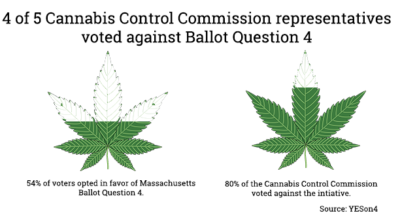
The five members of the Cannabis Control Commission were finalized last week by state officials, with the addition of three more appointees, according to a press release from Massachusetts Treasurer Deborah Goldberg’s office.
The CCC is to function as an independent agency, working to establish and regulate the recreational marijuana industry in the Commonwealth, according to the release.
Kay Doyle and Shaleen Title were jointly appointed by Governor Charlie Baker, Attorney General Maura Healey and Goldberg, according to the release. Healey individually chose attorney Britte McBride.
The other members of the commission include Goldberg’s selection of former business executive Steven Hoffman as the chair of the Commission and Baker’s naming of former Massachusetts State Senator Jennifer Flanagan.
Doyle and Title are the only two members of the commission who possess experience working with the marijuana industry in some capacity, according to the release. In addition, Title is the sole appointee of the CCC to take a pro-marijuana stance, with the state officials’ other choices voting against Question 4 this past November.
The Daily Free Press reported on election night that more than half of Massachusetts voters cast their ballot in favor of the legalization of recreational marijuana in state.
Jim Borghesani, who served as the communications director for the Yes on 4 campaign, said the state’s selections are concerning because the majority of the commission is opposed to legalization.
“I’d like to give them the benefit of the doubt that their personal positions won’t influence their professional responsibilities,” Borghesani said. “But, we’re still concerned that if deadlines are not met, or regulations are not written, that they’re not going to feel a great responsibility to rectify that because of their personal opinions.”
While Borghesani said he didn’t know if the state intentionally composed the CCC to be dominated by those against marijuana legalization, he said better efforts could have been made to include more individuals who voted in support of the referendum.
“In some cases, particularly the treasurer’s case, she was so limited with people that she could select,” Borghesani said. “But, I think that the attorney general and the government could easily have found a person who supported Question 4, and put them on the commission.”
Borghesani said he is also worried about proper funding, without which the CCC will not be able to craft an effective application to process.
“Right now, they do not have the proper funding to do so,” Borghesani said. “I would like to hear the [Massachusetts] Speaker of the House [Robert DeLeo], and the Massachusetts Senate President [Stanley Rosenberg] and the Governor [Charlie Baker] commit to giving them the resources that they need in order to meet their obligations.”
Despite Title being the sole commissioner in support of legalization, Borghesani said, her voice will not be drowned out.
“She’ll be very fair, and she will be a good voice for minorities and for anybody who was unduly affected by prohibition,” Borghesani said.
Kamani Jefferson, president of the Massachusetts Recreational Consumer Council, said Title has been involved with marijuana legalization efforts since college.
“[Title] helped write the law initiative for Question 4,” Jefferson said. “She also is the co-founder of the Minority Cannabis Business Association. She also runs the THC Staffing Group, which is a trading firm in the industry that specifically tries to roll out diverse candidates for cannabis shops across the country. She wrote the [marijuana] legalization law in Colorado.”
Jefferson said although Title may be able to sway the rest of the commission from enacting too strict of regulations on the marijuana industry, the rest of community is going to need to speak up in defense of legalization as well.
“I think it’s going to take not just her, it’s going to take everybody, all constituents, all consumers of Massachusetts, anyone involved in the state needs to reach out and try to sway the commission,” Jefferson said. “We need community help for sure.”
Several Boston residents expressed support for the CCC, citing economic and safety reasons alike.
Helen Stevenson, 63, of Charlestown said she did not vote in favor of legalizing marijuana because of the adverse effects it could have on those who require the substance for medicinal purposes.
“I believe in having it for medical use, and the fact that it’s legalized now is a concern to me because one, insurance companies aren’t going to pay for it, and they should be paying for it for people that need it for medical reasons,” Stevenson said. “It’s great for pain. I want also for some laws to fall into place about control.”
Timothy Reynolds, 24, of Back Bay said he agrees with the commission’s efforts to establish and oversee the new industry.
“I wouldn’t say I’m necessarily supportive of [marijuana use] but I would say I don’t think there’s a problem with legalizing it,” Reynolds said. “I think the [commission] is a good idea, like limiting the amount.”
Kelly Scherer, 27, of Kenmore said she is fully supportive of the commission and their endeavors because regulation allows for safer marijuana use among the public.
“Regulation makes it safer,” Scherer said. “It also brings money to the taxpayer. With medicinal marijuana legal anyway in Massachusetts, the regulation becomes more important because it’s more available.”





















































































































